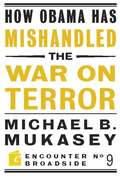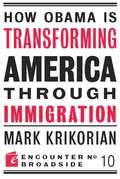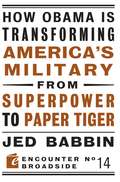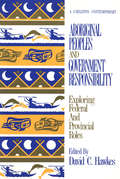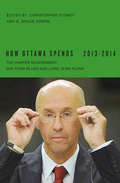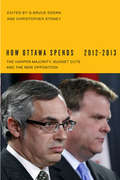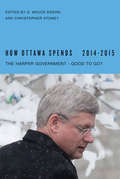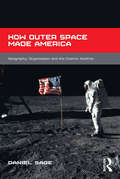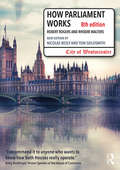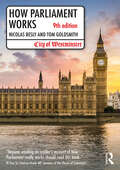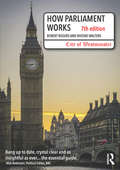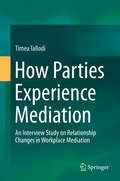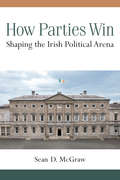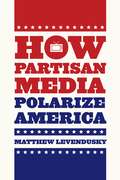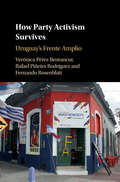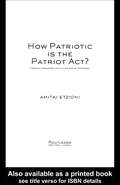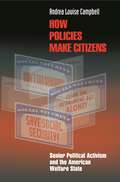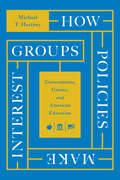- Table View
- List View
How Obama Has Mishandled the War on Terror
by Michael Bernard MukaseyIN this illuminating Broadside, former Attorney General Michael B. Mukasey shows how Barrack Obama has taken the war on terror from the adult realities of George W. Bush, where hard choices were faced and made, and the nation kept safe, to an adolescent fantasy world where we can at once be nobler than the law requires and safer than we were before. Obama rejects as an unnecessary sacrifice of our ideals the stern measures adopted by his predecessor, and offers instead to limit our intelligence gathering and provide terrorists with better conditions than common criminals, in the name of lofty idealism. Instead of protecting Americans, he builds castles in the air and invites us to stay safe by living in them.
How Obama is Transforming America Through Immigration
by Mark KrikorianPresident Obama and his allies have made no secret about their immigration goals: easy amnesty, loose enforcement, and ever-higher levels of legal immigration. One prominent labor leader has boasted that continued mass immigration "will solidify and expand the progressive coalition for the future."In this penetrating Broadside, Mark Krikorian lays out the details of Obama's open-borders approach to immigration and its political consequences. Krikorian, one of the leading critics of current immigration policy, examines the Administration's record of weakening enforcement and describes how legislation crafted by the president's supporters in Congress would ensure new waves of illegal immigration. Krikorian also explains how continued high levels of immigration, regardless of legal status, would progressively move the United States in the direction of more government and less liberty.
How Obama is Transforming America's Military from Superpower to Paper Tiger
by Jed BabbinBarack Obama has made it clear that he thinks the world would be a better and more peaceful place if the United States were too weak to affect the course of events. Obama, along with Secretary of Defense Robert Gates, has slashed missile defense, dramatically reduced investment in future military technologies, and broken promises to our allies. In addition, Obama is transforming our military into a politically correct force that no one will want to join.In this incisive Broadside, Jed Babbin analyzes Obama's military strategy and shows how he has pursued a consistent course of action that defines him and his overriding objective - to reduce America from a superpower to a paper tiger. These are not the policies of a president who wants America to be strong, safe, and secure. But they are the policies that define Barack Obama.ENCOUNTER BROADSIDES: a new series of critical pamphlets from Encounter Books. Uniting an 18th-century sense of political urgency and rhetorical wit (think The Federalist Papers, Common Sense) with 21st-century technology and channels of distribution, Encounter Broadsides offer indispensable ammunition for intelligent debate on the critical issues of our time. Written with passion by some of our most authoritative authors, Encounter Broadsides make the case for liberty and the institutions of democratic capitalism at a time when they are under siege from the resurgence of collectivist sentiment. Read them in a sitting and come away knowing the best we can hope for and the worst we must fear.
How Obama's Gender Policies Undermine America
by Diana Furchtgott-RothWomen are riding out the recession more easily than men, with a lower unemployment rate and a higher percentage attaining high school diplomas and Bachelor and Master degrees. Yet President Obama and Congress, responding to fierce feminist lobbying, propose to expand preferences for women in both education and hiring. Whereas original feminists portrayed women as equal to men, the 21st century feminist message is that women cannot succeed without affirmative action. Not only does this harm men by reducing their opportunities, but it hurts women by invalidating any legitimate credentials gained without the benefit of gender preferences.The great irony is that women succeed in everyday America, but are doomed to failure in the distorted lens of radical feminists. A woman who chooses a job with a flexible schedule in order to have time both for her family and her career thinks of herself as successful. But to feminists, she is a failure because she has chosen a lower earnings path rather than the CEO track.
How Ottawa Spends 2008-2009
by Allan MasloveThe twenty-ninth edition of How Ottawa Spends focuses on the policies of the Harper government and the course of federal-provincial relations. Leading scholars of Canadian public policy explore several key policy areas, including fiscal balance in the federation, tax policy, regulatory capacity, the federal funding of territorial and northern Aboriginal governments, child care policy, higher education policy, telecommunications policy, and the rapid appearance and disappearance of the federal social economy initiative - i.e., "how Ottawa doesn't spend." Contributors include Frances Abele (Carleton & IRPP), Cheryl N. Collier (Carleton), Geoffrey Hale (University of Lethbridge), Walter Hettich (emeritus, California State), Edward T. Jackson (Carleton), Rianne Mahon (Carleton), Allan M. Maslove (Carleton), Clara Morgan (Carleton), Michael J. Prince (University of Victoria), Richard Schultz (McGill), Robert Slater (Carleton), Barry Stemshorn (University of Ottawa), and Stanley L. Winer (Carleton).
How Ottawa Spends 2008-2009: A More Orderly Federalism? (Carleton Contemporary Series)
by Allan MasloveThe twenty-ninth edition of How Ottawa Spends focuses on the policies of the Harper government and the course of federal-provincial relations. Leading scholars of Canadian public policy explore several key policy areas, including fiscal balance in the federation, tax policy, regulatory capacity, the federal funding of territorial and northern Aboriginal governments, child care policy, higher education policy, telecommunications policy, and the rapid appearance and disappearance of the federal social economy initiative - i.e., "how Ottawa doesn't spend." Contributors include Frances Abele (Carleton & IRPP), Cheryl N. Collier (Carleton), Geoffrey Hale (University of Lethbridge), Walter Hettich (emeritus, California State), Edward T. Jackson (Carleton), Rianne Mahon (Carleton), Allan M. Maslove (Carleton), Clara Morgan (Carleton), Michael J. Prince (University of Victoria), Richard Schultz (McGill), Robert Slater (Carleton), Barry Stemshorn (University of Ottawa), and Stanley L. Winer (Carleton).
How Ottawa Spends, 2012-2013
by Christopher Stoney G. Bruce DoernContinuing its tradition of current, exemplary scholarship, the 2012-13 edition of How Ottawa Spends casts a critical eye at national politics, priorities, and policies, with an emphasis on the Conservative majority's mandated austerity measures and budget-cutting strategies. Leading scholars from across Canada examine a new era of majority government and a transformed political opposition both in Parliament and in provincial politics. Several closely linked political, policy, and spending realms are examined, including corporate tax reform, Conservative Party social policy, regional economic development, science and technology investments, Canada-US perimeter security and trade agreements, the rise and fall of regulatory regimes, and Canadian health care. Related governance issues such as federal infrastructure program impacts, the Harper government's Economic Action Plan impacts in Ontario, and community colleges in the federal innovation agenda, are also discussed in detail.
How Ottawa Spends, 2012-2013: The Harper Majority, Budget Cuts, and the New Opposition
by Christopher Stoney G. Bruce DoernContinuing its tradition of current, exemplary scholarship, the 2012-13 edition of How Ottawa Spends casts a critical eye at national politics, priorities, and policies, with an emphasis on the Conservative majority's mandated austerity measures and budget-cutting strategies. Leading scholars from across Canada examine a new era of majority government and a transformed political opposition both in Parliament and in provincial politics. Several closely linked political, policy, and spending realms are examined, including corporate tax reform, Conservative Party social policy, regional economic development, science and technology investments, Canada-US perimeter security and trade agreements, the rise and fall of regulatory regimes, and Canadian health care. Related governance issues such as federal infrastructure program impacts, the Harper government's Economic Action Plan impacts in Ontario, and community colleges in the federal innovation agenda, are also discussed in detail.
How Ottawa Spends, 2012-2013: The Harper Majority, Budget Cuts, and the New Opposition (How Ottawa Spends Series)
by Christopher Stoney G. Bruce DoernContinuing its tradition of current, exemplary scholarship, the 2012-13 edition of How Ottawa Spends casts a critical eye at national politics, priorities, and policies, with an emphasis on the Conservative majority's mandated austerity measures and budget-cutting strategies. Leading scholars from across Canada examine a new era of majority government and a transformed political opposition both in Parliament and in provincial politics. Several closely linked political, policy, and spending realms are examined, including corporate tax reform, Conservative Party social policy, regional economic development, science and technology investments, Canada-US perimeter security and trade agreements, the rise and fall of regulatory regimes, and Canadian health care. Related governance issues such as federal infrastructure program impacts, the Harper government's Economic Action Plan impacts in Ontario, and community colleges in the federal innovation agenda, are also discussed in detail.
How Ottawa Spends, 2013-2014: The Harper Government: Mid-Term Blues and Long-Term Plans (How Ottawa Spends Series)
by Christopher Stoney G. Bruce DoernThe 2013-14 edition of How Ottawa Spends critically examines national politics, priorities, and policies with a close lens on Stephen Harper's Conservative party during the middle of their first term as a majority. Contributors from across Canada examine the federal government and its not uncommon mid-term problems but also its considerable agenda of long term plans, both set in the midst of national economic fragility and a global fiscal and debt crisis. Individual chapters examine several related political, policy, and spending realms including the Budget Action Plan, the ten year Canada Health Transfer Plan, the Canada Pension Plan, and Old Age Security reforms. The contributors also consider austerity related public sector downsizing and strategic spending reviews, national energy, and related environmental strategies, and the growing Harper practice of "one-off" federalism.
How Ottawa Spends, 2014-2015
by G. Bruce DoernThe 2014-15 edition of How Ottawa Spends critically examines national politics and related fiscal, economic, and social priorities and policies, with an emphasis on the now long-running Harper-linked Senate scandal and the serious challenges to Harper's leadership and controlling style of attack politics. Contributors from across Canada examine the Conservative government agenda both in terms of its macroeconomic fiscal policy and electoral success since 2006 and also as it plans for a 2015 electoral victory with the aid of a healthy surplus budgetary war chest. Individual chapters examine several closely linked political, policy, and spending realms including the growing strength and nature of the Justin Trudeau-led Liberal Party challenge, the 2014 Harper Economic Action Plan, the demise of federal environmental policy under Harper’s responsible resource development strategy, the Conservative’s crime and punishment agenda, the growing evidence regarding the federal government’s muzzling of scientists and evidence in federal policy formation, and the now five-year story of the Harper creation, treatment, and role of the Parliamentary Budget Officer.
How Ottawa Spends, 2014-2015: The Harper Government - Good to Go?
by Christopher Stoney G. Bruce DoernThe 2014-15 edition of How Ottawa Spends critically examines national politics and related fiscal, economic, and social priorities and policies, with an emphasis on the now long-running Harper-linked Senate scandal and the serious challenges to Harper's leadership and controlling style of attack politics. Contributors from across Canada examine the Conservative government agenda both in terms of its macroeconomic fiscal policy and electoral success since 2006 and also as it plans for a 2015 electoral victory with the aid of a healthy surplus budgetary war chest. Individual chapters examine several closely linked political, policy, and spending realms including the growing strength and nature of the Justin Trudeau-led Liberal Party challenge, the 2014 Harper Economic Action Plan, the demise of federal environmental policy under Harper’s responsible resource development strategy, the Conservative’s crime and punishment agenda, the growing evidence regarding the federal government’s muzzling of scientists and evidence in federal policy formation, and the now five-year story of the Harper creation, treatment, and role of the Parliamentary Budget Officer.
How Outer Space Made America: Geography, Organization and the Cosmic Sublime
by Daniel SageIn this innovatory book Daniel Sage analyses how and why American space exploration reproduced and transformed American cultural and political imaginations by appealing to, and to an extent organizing, the transcendence of spatial and temporal frontiers. In so doing, he traces the development of a seductive, and powerful, yet complex and unstable American geographical imagination: the ’transcendental state’. Historical and indeed contemporary space exploration is, despite some recent notable exceptions, worthy of more attention across the social sciences and humanities. While largely engaging with the historical development of space exploration, it shows how contemporary cultural and social, and indeed geographical, research themes, including national identity, critical geopolitics, gender, technocracy, trauma and memory, can be informed by the study of space exploration.
How Parliament Works
by Nicolas Besly Tom GoldsmithParliament is constantly in the news and televised daily, but much of its work remains a mystery to outsiders and is sometimes perplexing even to its own members. Written by expert insiders, How Parliament Works is a straightforward and readable analysis of one of the country’s most complex – and often misunderstood – institutions. Covering every aspect of the work, membership and structures of both Houses, this key text provides a unique insight into the work and daily life of Parliament. It explains not only what happens but why and analyses the institution’s strengths and weaknesses, as well as opportunities for Parliament to be more effective. The eighth edition has been substantially revised to take account of recent changes in both Houses, and to cover all the key issues affecting Parliament and politics, such as: Parliament, Brexit and Europe – the impact of the referendum vote on Parliament to date, Parliament’s role in implementing Brexit and its role thereafter; Questions about how much Parliament is a genuinely representative body of the population at large in its diversity; The latest developments in the legislative process, party discipline and rebellion; The ‘English votes for English laws’ procedures; The effects of a minority government; Changes to the Budget cycle; Updates on the arrangements for the internal management of both Houses, reflecting governance reviews, with all statistics and examples fully updated throughout. How Parliament Works is essential reading for anyone who has anything to do with the Westminster Parliament: journalists, civil servants, lawyers, lobbyists, business and trade associations, diplomats, overseas parliaments and international bodies – and indeed members of both Houses. How Parliament Works is also an invaluable companion to the study of politics at AS, A2 and university level, and provides a wealth of source material for teachers.
How Parliament Works
by Nicolas Besly Tom GoldsmithWritten by expert insiders, How Parliament Works is a straightforward and readable analysis of one of the country’s most complex – and often misunderstood – institutions. Covering every aspect of the work, membership and structures of both Houses, this key text provides a unique insight into the work and daily life of Parliament. The ninth edition has been substantially revised to take account of recent changes in both Houses, and to cover all the key issues affecting Parliament and politics, such as: Changes in membership of both Houses since the 2019 general election Developments on Brexit, including Parliament’s scrutiny of post-Brexit arrangements Coverage of recent issues such as the Cherry/Miller prorogation case and its implications for the constitutional role of Parliament, the role of the Speaker in the Brexit process, dissent in Parliament and disagreement between the Houses Updates on developments on restoration and renewal New material on representation of different groups in and by Parliament Explanations of Parliament’s response to allegations of bullying and harassment How Parliament adapted to carry on functioning during the covid-19 pandemic New in-text features, case studies and photographs How Parliament Works is essential reading for anyone who has anything to do with the Westminster Parliament: journalists, civil servants, lawyers, lobbyists, business and trade associations, diplomats, overseas parliaments and international bodies – and indeed members of both Houses. How Parliament Works is also an invaluable companion to the study of politics at A, A2 and university level, and provides a wealth of source material for teachers.
How Parliament Works
by Robert Rogers Rhodri WaltersWritten by expert insiders, How Parliament Works is a straightforward and readable analysis of one of the country's most complex – and often misunderstood – institutions. Covering every aspect of the work, membership and structures of both Houses, this key text provides a unique insight into the work and daily life of Parliament. It explains not only what happens but also why, and analyses the institution’s strengths and weaknesses, as well as opportunities for Parliament to be more effective. The seventh edition has been substantially revised to take account of recent changes in both Houses and to cover all the key issues affecting Parliament and politics, such as: • the Fixed Term Parliaments Act; • the implications of coalition politics; • recent developments in Lords reform; • the Independent Parliamentary Standards Authority's role in pay and expenses; • advances in scrutiny techniques; • changes in parliamentary cycles of business and finance; • member conduct and interests; • reform and modernisation. It also covers the latest developments in the legislative process, party discipline and rebellion, the procedure of both Houses, select committee work, and the relationship between Parliament and the European Union. All statistics and examples have been fully updated. How Parliament Works is essential reading for anyone who has anything to do with the Westminster Parliament: journalists, civil servants, lawyers, lobbyists, business and trade associations, diplomats, overseas parliaments and international bodies – and, indeed, members of both Houses.
How Parties Experience Mediation: An Interview Study on Relationship Changes in Workplace Mediation
by Timea TallodiThis book presents an unprecedented qualitative research study on relational changes in mediation with a truly interdisciplinary outset, drawing on the literature on psychology, alternative dispute resolution and business. Mediation's potential to induce changes in parties' relationships as an advantage of the process is commonly mentioned in the literature. However, despite its being a key to reconciliation, relational changes in mediation has not yet been a topic of foundational and fine-grained qualitative enquiry. As the first study in the literature, this research uses in-depth interviews with mediation parties and the qualitative methodology of interpretative phenomenological analysis in order to explore participants' lived experiences. The phenomenological stance ensures a particularly rich data set and a nuanced interpretative analysis. This pioneering piece of research seeks to enter mediation parties' true experiences as closely as possible, moving beyond pre-existing theoretical, quantitative and large-scale qualitative explorations. The themes are discussed in the context of theory, research and practice. Therefore, this book advances knowledge about mediation both in theoretical and practical terms. Innovative conclusions and recommendations are provided for developing mediation practice, mediation training programmes, and further research.
How Parties Win
by Sean D. McgrawIn recent decades, Ireland's three major political parties have maintained over 80 percent of the vote in the face of rapidly shifting social divisions, political values, and controversial issues, though not by giving voice to particular interest groups or reacting to issues of the day. Rather, Sean D. McGraw reveals how party leaders select, or purposely sideline, pressing political and social issues in order to preserve their competitive advantage. By relegating divisive issues to extraparliamentary institutions, such as referenda or national wage bargaining systems, major parties mitigate the effects of changing environments and undermine the appeal of minor parties. This richly textured case study of the major parties in the Republic of Ireland engages the broader comparative argument that political parties actively shape which choices are available to the electorate and just as importantly which are not. Additionally, McGraw sets a new standard for mixed-method research by employing public opinion surveys, party manifestos, content analysis of media coverage, the author's own survey of nearly two-thirds of Irish parliamentarians in both 2010 and 2012, and personal interviews conducted over the course of six years. "
How Partisan Media Polarize America
by Matthew LevenduskyForty years ago, viewers who wanted to watch the news could only choose from among the major broadcast networks, all of which presented the same news without any particular point of view. Today we have a much broader array of choices, including cable channels offering a partisan take. With partisan programs gaining in popularity, some argue that they are polarizing American politics, while others counter that only a tiny portion of the population watches such programs and that their viewers tend to already hold similar beliefs. <P><P> In How Partisan Media Polarize America, Matthew Levendusky confirms--but also qualifies--both of these claims. Drawing on experiments and survey data, he shows that Americans who watch partisan programming do become more certain of their beliefs and less willing to weigh the merits of opposing views or to compromise. And while only a small segment of the American population watches partisan media programs, those who do tend to be more politically engaged, and their effects on national politics are therefore far-reaching. <P>< In a time when politics seem doomed to partisan discord, How Partisan Media Polarize America offers a much-needed clarification of the role partisan media might play.
How Partisan Media Polarize America (Chicago Studies In American Politics Ser.)
by Matthew LevenduskyForty years ago, viewers who wanted to watch the news could only choose from among the major broadcast networks, all of which presented the same news without any particular point of view. Today we have a much broader array of choices, including cable channels offering a partisan take. With partisan programs gaining in popularity, some argue that they are polarizing American politics, while others counter that only a tiny portion of the population watches such programs and that their viewers tend to already hold similar beliefs. In How Partisan Media Polarize America, Matthew Levendusky confirms—but also qualifies—both of these claims. Drawing on experiments and survey data, he shows that Americans who watch partisan programming do become more certain of their beliefs and less willing to weigh the merits of opposing views or to compromise. And while only a small segment of the American population watches partisan media programs, those who do tend to be more politically engaged, and their effects on national politics are therefore far-reaching. In a time when politics seem doomed to partisan discord, How Partisan Media Polarize America offers a much-needed clarification of the role partisan media might play.
How Party Activism Survives: Uruguay's Frente Amplio
by Verónica Pérez Bentancur Rafael Piñeiro Rodríguez Fernando RosenblattPolitical parties with activists are in decline due to various external shocks. Societal changes, like the emergence of new technologies of communication have diminished the role and number of activists, while party elites increasingly can make do without grassroots activists. However, recent scholarship concerning different democracies has shown how activism still matters for representation. This book contributes to this literature by analyzing the unique case of the Uruguayan Frente Amplio (FA), the only mass-organic, institutionalized leftist party in Latin America. Using thick description, systematic process tracing, and survey research, this case study highlights the value of an organization-centered approach for understanding parties' role in democracy. Within the FA, organizational rules grant activists a significant voice, which imbues activists' participation with a strong sense of efficacy. This book is an excellent resource for scholars and students of Latin America and comparative politics who are interested in political parties and the challenges confronting new democracies.
How Patriotic is the Patriot Act?: Freedom Versus Security in the Age of Terrorism
by Amitai EtzioniIn this short book, Etzioni, the well-known and respected public intellectual and communitarian thinker, charts a middle course, or third way 'between those who are committed to shore up our liberties but blind to the needs of public security, as well as those who never met a right they are not willing to curtail to give authorities an even freer hand.' This book will prove a useful guide for citizens looking for a thought provoking, well-reasoned and sober analysis of one of the hot button issues of our time.
How People Respond to Violence: Everyday Peace and the Maoist Conflict in India (Rethinking Peace and Conflict Studies)
by Monica CarrerThis book explores the powerful role of ordinary people's agency in times of violent conflict. Drawing on extensive fieldwork and a Critical Discourse Analysis, the author draws out the motivations, drivers and strategies at individual and community levels. With a focus on people’s own voices, this research highlights rich findings showing a wide range of experiences and actions that people engaged in during the violent conflict, and dimensions that are often missed in dominant explanations of violent conflict. Therefore, while looking at peace and conflict from an everyday perspective, the question of power and the meaning of peace knowledge become central. This monograph addresses the power of people’s agency not only in shaping the politics and dynamics of violence, but also in redefining what ‘peace’ and ‘change’ ought to look like. Essential reading for researchers and students of Peace and Conflict Studies, and also International Relations, Security Studies, Resistance Studies, Anthropology, Politics, International Development.
How Policies Make Citizens: Senior Political Activism and the American Welfare State (Princeton Studies in American Politics: Historical, International, and Comparative Perspectives #83)
by Andrea Louise CampbellSome groups participate in politics more than others. Why? And does it matter for policy outcomes? In this richly detailed and fluidly written book, Andrea Campbell argues that democratic participation and public policy powerfully reinforce each other. Through a case study of senior citizens in the United States and their political activity around Social Security, she shows how highly participatory groups get their policy preferences fulfilled, and how public policy itself helps create political inequality. Using a wealth of unique survey and historical data, Campbell shows how the development of Social Security helped transform seniors from the most beleaguered to the most politically active age group. Thus empowered, seniors actively defend their programs from proposed threats, shaping policy outcomes. The participatory effects are strongest for low-income seniors, who are most dependent on Social Security. The program thus reduces political inequality within the senior population--a laudable effect--while increasing inequality between seniors and younger citizens. A brief look across policies shows that program effects are not always positive. Welfare recipients are even less participatory than their modest socioeconomic backgrounds would imply, because of the demeaning and disenfranchising process of proving eligibility. Campbell concludes that program design profoundly shapes the nature of democratic citizenship. And proposed policies--such as Social Security privatization--must be evaluated for both their economic and political effects, because the very quality of democratic government is influenced by the kinds of policies it chooses.
How Policies Make Interest Groups: Governments, Unions, and American Education
by Michael T. HartneyA critical, revelatory examination of teachers unions' rise and influence in American politics. As most American labor organizations struggle for survival and relevance in the twenty-first century, teachers unions appear to be an exception. Despite being all but nonexistent until the 1960s, these unions are maintaining members, assets—and political influence. As the COVID-19 epidemic has illustrated, today’s teachers unions are something greater than mere labor organizations: they are primary influencers of American education policy. How Policies Make Interest Groups examines the rise of these unions to their current place of influence in American politics. Michael Hartney details how state and local governments adopted a new system of labor relations that subsidized—and in turn, strengthened—the power of teachers unions as interest groups in American politics. In doing so, governments created a force in American politics: an entrenched, subsidized machine for membership recruitment, political fundraising, and electoral mobilization efforts that have informed elections and policymaking ever since. Backed by original quantitative research from across the American educational landscape, Hartney shows how American education policymaking and labor relations have combined to create some of the very voter blocs to which it currently answers. How Policies Make Interest Groups is trenchant, essential reading for anyone seeking to understand why some voices in American politics mean more than others.
